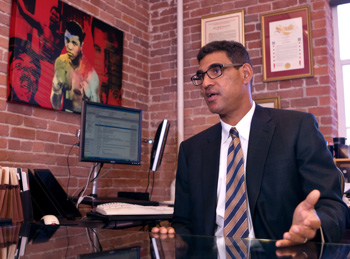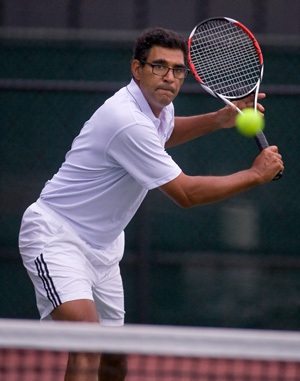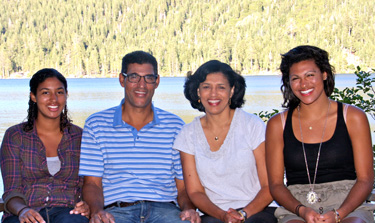Inspired by mentors, Jon Streeter forges
his legal legacy and becomes a mentor himself
By Diane Curtis
Staff Writer
It’s no accident that the two Andy Warhol-style oil paintings
that grace Jon Streeter’s sunny, high-ceilinged Jackson Square office
feature Muhammad Ali and Albert Einstein.
“I’ve got two
geniuses who I greatly admire on my wall, both of them masters of their
different fields,” says the partner at Keker & Van Nest in San
Francisco and next president of The State Bar of California. “Both had a
huge impact on their generations and beyond.”
 |
A painting of Muhammad Ali, who Streeter says is one of the geniuses
who inspire him, hangs on his office wall.
Darryl Bush photo
|
Intelligent, thoughtful people to
look up to are a recurrent theme in conversations with Streeter, who will be
sworn in as the bar’s 87th president at this month’s
annual meeting in Long Beach. He speaks admiringly of two of his earliest legal
mentors — U.S. District Judge Thelton Henderson, whom Streeter describes
as an “institution,” and Judge Harry Edwards, former chief of the
U.S. Court of Appeal for the District of Columbia circuit. Three decades after
he clerked for them, he still considers them friends and mentors and feels he
can call them when the situation warrants to ask for advice, “to lay out
professional challenges” and get their learned perspective. Such
relationships, he says, “really are the key to achieving success.”
Streeter, 54, has reached the
stage where he is forging his own legal legacy and is mentor to young lawyers,
a role he greatly enjoys.
“He is somebody who has
looked out for me, somebody I can go to for advice,” says Khari Tillery,
an associate at Keker who has worked with Streeter. “He seems to be
someone who wants to help people.”
Fourteen years ago,
Streeter moved to the litigation firm of Keker & Van Nest after 15 years at
Orrick Herrington & Sutcliffe LLP. “I wanted to practice with lawyers
who are thinking — all day, everyday — about trials,”
Streeter says, adding that he loves and found he was good at such litigation
elements as research, storytelling and sometimes even a little acting. Tillery
calls him “an amazing trial lawyer” with an ability to “work
on the fly and adjust a case,” all the while telling a compelling story
to the judge or jury. “He’s incredibly savvy and smart and able to
pick apart nuances of a case.”
John Keker says that besides
being smart and a good partner, Streeter is a person who is sensitive to other
people’s concerns and knows how to build consensus, qualities that will
make him “a wonderful bar president.”
Consensus by the Board of Governors was not in evidence last year during debate on a
new governance structure mandated by the legislature that pitted Streeter and a
majority of the governance task force who favor maintaining a structure close
to the current one against another group who wanted more public members and a
smaller board.
Streeter concedes there has been
“factionalization — almost cliqueishness” on the board, but
he says that can be overcome. He thinks he was elected in part to mend
fences. “I want to try to build bridges.”
 |
A serious tennis player, Streeter starts the day
at the Berkeley Tennis Club.
Darryl Bush photo
|
He also notes that disagreement
in the past does not mean the board can’t work together. To illustrate,
he jumps up from his chair at his glass desk and picks up a 1958 Life magazine
with Willie Mays on the cover: “Willie Mays Leads Giants Into San
Francisco” says the headline. The vintage magazine, in perfect condition
and wrapped in plastic, was a gift from George Davis, one of the public board
members who, Streeter adds, most likely voted for someone other than him for
president. The good will between the two men, symbolized by the gift,
“meant more than any vote,” Streeter says. And it shows that people
who disagree can talk to each other, he adds.
The coming year will produce a board
committed to the same goals, Streeter predicts: reducing the discipline backlog
and promoting access to justice. “The legislature has certainly
communicated to us that they want us to get our house in order in the area of
discipline and also they want to see the fair administration of justice,”
which means promoting access to justice for everyone, says Streeter.
When he “passes the
gavel” to the 88th president next year, he wants to be able to
report that the backlog of discipline cases is zero. Divisiveness among the
board will only make it more difficult to reach that goal. “We have to
feel a shared sense of mission.”
Outgoing board member Joseph
Chairez thinks if anybody can bring the board together and accomplish the
discipline goals, it’s Streeter. “I’m a big Streeter
fan,” says Chairez. “I think that Jon is going to be a great asset
to the bar as the president. He’s not only very intelligent, but
he’s thoughtful and easy to work with and is the type of person who seeks
to get consensus.”
He also, adds Chairez,
“speaks from a position of knowledge. He takes the time to learn and read
and understand something rather than just talk off the top of his head.”
 |
Jon Streeter is flanked by his daughter, Hillary, 19 (left) wife Dorine (right)
and daughter Lindsey, 21 (far right) .
|
Streeter says that besides
improving the discipline system, finding money for legal services and building
a more united board, he will regularly work with Chief Justice Tani
Cantil-Sakauye “on solving the funding crisis in the court system.”
He’ll be regularly speaking on that issue, “getting the word
out” that divorces are going to take two or three years, adoptions are
going to take a very long time, child support orders and domestic violence
restraining orders will not necessarily be easily enforced. It’s the
“have-nots” who are going to be most hurt, Streeter says. The large
firms will hire their own judges and courtrooms.
Streeter grew up in Seattle, the
second of four sons to a black father and a white mother. His father was an
architect, his mother a homemaker. One brother followed in their father’s
footsteps and is an architect, another is a reporter for the Los Angeles Times
and the third is a freelance writer.
The family lived in the
Scandinavian section of the city, and while Streeter “didn’t know
what race was” when he was very young, the slights and discrimination
“hit you in the face in lots of different ways” as he grew up, from
not being invited to birthday parties to being rejected for prom dates because
parents wouldn’t allow their daughters to be with him. “It was very
painful.”
But, he adds, “We
didn’t spend a lot of time being bitter.”
Instead, Streeter approached
racism much as he seems to approach many subjects: almost as an anthropologist.
“I was always really interested in how people looked at things.”
That curiosity extends to almost everything he does. He loves that litigation
allows him to delve into a variety of subjects – patents, construction,
computers, cutting-edge science, civil rights, biotech. When the U.S.
Supreme Court makes a decision, he carries the ruling around in his briefcase
until he gets a chance to read it; he doesn’t rely on a media filter. He
also stood out as a board member who carefully studied the proposed changes in
the Rules of Professional Conduct and demanded a rationale for those changes.
A high school tennis and
basketball player, Streeter originally dreamed of being a professional athlete.
But he got a Martin Luther King scholarship to Stanford, and he found that he
wasn’t going to be good enough to be a professional athlete and that he
also needed to work a lot harder than he had at his public schools to do well
academically. It was at Stanford that he decided he wanted to become a lawyer
and went on to Boalt Hall School of Law.
“I love the practice of
law. I love the law. I’ve been living in the world of the law for three
decades now. It’s something I’m committed to.”
That commitment includes wanting
to take the next step to the bench. He has confirmed that he has applied to
become a federal judge, not least because of what he has witnessed in the
performance of his friends and mentors, Judges Henderson and Edwards.
The soon-to-be State Bar president
says he will have to cut down on his cases, which average about six at a time
with two or three trials a year. He says past presidents have told him they
spend about 40 percent of their time on State Bar business. Streeter will
continue to do fundraising for President Obama “a small fraction”
of my time. “One of my closest friends from college is Valerie
Jarrett,” he says. “Suddenly she’s sitting next to the
president helping run the world. I believe in what they’re doing.”
Streeter and his wife, Dorine
Holsey Streeter, executive vice president at the commercial real estate firm of
James Campbell Co., have two daughters, Hillary, 19, a student at Stanford, and
Lindsey, 21, a student at Occidental College. “We’re very
proud,” he says.